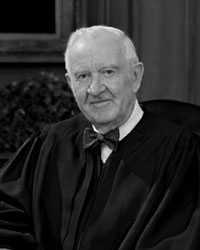Many conservative were shocked and stunned when Chief Justice John Roberts voted with the four liberal justices to sustain Obamacare last week. Roberts, a GW Bush appointee with sterling conservative credentials had somehow flipped on the issue and migrated over to the other side to allow the government to mandate that each individual must join the national healthcare program.
If they don't participate in the plan, then they will be assessed a penalty, which Chief Justice Roberts decided to call a tax. Since he knows that Congress really does have the power to tax, even though Congress lacks the authority to impose penalties for people failing to take some action.
Chief Justice Roberts chose to label this penalty as a tax, despite President Obama and every elected Democrat calling it "not a tax" because that was the only way it would be constitutional. And Chief Justice Roberts desperately wanted to not overturn the law.
What were Roberts motives for wanting to sustain the individual mandate in Obamacare?
And why did he torture the definition of "tax" to make it seem as if a fine was a tax?
Let's be clear here. Taxes are something that applies to everyone in a class. Fines are something you only certain individuals have to pay when they break some law. Like speeding, or parking illegally, or dumping litter on the street.
Although
Roberts rejected the Obama administration’s novel claim that
Congress may force Americans to buy health insurance as part of its
power to regulate interstate commerce, he nonetheless found the
health insurance mandate to be lawful under a different
constitutional provision, Congress’ power to “lay and collect
taxes.”
There is considerable evidence now that Roberts was initially planning to strike down the mandate as unconstitutional, but then was affected by pressure from the media, and from President Obama himself. Roberts did not want to appear to be a rightwing ideologue, so he moved over to the liberal position by calling the fine "a tax" and then claiming keeping the law intact would be a sign of judicial restraint. And this is a position he has consistently held.
There were countless news articles in May warning of damage
to the Court – and to Roberts’ reputation – if the Court were to strike
down the mandate. Leading politicians, including the President himself,
had expressed confidence the mandate would be upheld.
Some even suggested that if Roberts struck down the
mandate, it would prove he had been deceitful during his confirmation
hearings, when he explained a philosophy of judicial restraint.

So what went wrong here?
In my view, the Conservatives have suffered this loss because they always select outstanding nominees for the highest court, and don't impose political demands on them. In contrast, the Liberal Democrats always select leftwing ideologues, who happen to be mediocre judges.

Judicial ideologues are much more predictable than outstanding jurists are. You always can count on mediocre judges like Ruth Bader Ginsberg (the co-founder of the Women's Rights Project and ACLU General Counsel) or Elena Kagan (former clerk to Thurgood Marshall and Obama crony) to vote the party line. You just can't count on an outstanding jurist to toe the party line.
This isn't the first time Republican Presidents have been burned by selecting the best jurists rather than the best ideologues.
President Dwight Eisenhower appointed
Earl Warren to the court. A decision he later called "the biggest mistake of my life."
 President Richard Nixon
President Richard Nixon appointed both
Harry Blackmun and
Lewis Powell. Blackmun was the author of the Roe vs. Wade decision that legalized abortions in the USA. Lewis Powell spent his tenure on the court as a moderate to liberal swing vote.
President Gerald Ford appointed
John Paul Stevens to the court. While Stevens was initially a conservative judge, he migrated leftwards over his career, firmly establishing himself as a reliable liberal vote.
President GH Bush appointed
David Souter to the court.
Souter was touted as a conservative judge, but he also migrated
leftwards, eventually voting with Ginsberg, Breyer, and Stevens on every
important issue.

And now we have
John Roberts, appointed by
GW Bush who has moved over to the other side on some very important recent issues (Immigration and Obamacare).
The Republican's pay a dear price for appointing the best
judges they can find rather than the best ideologues. They could learn a
lesson from their Democrat colleagues, who always select mediocre
judges who just happen to have the right politics.
It certainly throws cold water on the argument that "we should elect a Republican President to assure that the Court upholds the Constitution" when the swing vote in this important case was a conservative judge appointed by a Republican President.



















